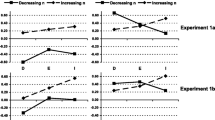Abstract
Previous findings on social comparison behavior established in a laboratory setting were extended to a natural setting. The research strategy to accomplish this represents an intermediate point on the dimension from basic laboratory research to basic research in the natural setting. The research depended on the natural environment for the independent variable (grades in a college class) but had the advantage of a controlled experimental chamber, arbitrary responses, and an automated apparatus for the dependent measure. Cumulative points earned on assignments by college students were entered in an apparatus that students used one-at-a-time to check their scores in a room adjoining the classroom. Cumulative points were changed weekly over a 7-week course. Automatically recorded button-press responses by the students (audit responses) allowed access to self-, other person, and standard scores (i.e., scores indicating A, B, and C grade levels). Self-scores were audited most consistently and standard scores were checked more than any other person’s score. Persons in middle positions with respect to point totals emitted more self-, coactor, and standard audits than persons in the high or low ranks. The middle position provided the most information about availability of the major reinforcer, being ahead, because in the middle position a student’s cumulative score had a greater chance of fluctuating over all three positions.
Similar content being viewed by others
References
BAER, D.M. 1978. On the relation between basic and applied research. In A. C. Catania & T. A. Brigham (Eds.), Handbook of applied behavior analysis: Social and instructional processes. New York: Irvington Publishers, Inc.
BANDURA, A., & WHALEN, C. K. 1966. The influence of antecedent reinforcement and divergent modeling cues on patterns of self reward. Journal of Personality and Social Psychology, 3, 373–382.
BERNSTEIN, D. J., & EBBESEN, E. B. 1978. Reinforcement and substitution in humans: A multiple-response analysis. Journal of the Experimental Analysis of Behavior, 30, 243–253.
EMURIAN, H. H., EMURIAN, C. S., BIGELOW, G. E., & BRADY, J. V. 1976. The effects of a cooperation contingency on behavior in a continuous three-person environment. Journal of the Experimental Analysis of Behavior, 25, 293–302.
FESTINGER, L. 1954. A theory of social comparison processes. Human Relations, 7, 117–140.
HAKE, D. F., & VUKELICH, R. Rate of auditing self and coactor performance scores as a supplementary monitor of reinforcer effectiveness. Behavior Modification. In press.
HAKE, D. F., VUKELICH, R., & KAPLAN, S. J. 1973. Audit responses: Responses maintained by access to existing self or coactor scores during nonsocial, parallel work, and cooperation procedures. Journal of the Experimental Analysis of Behavior, 19, 409–423.
VUKELICH, R., & HAKE, D. J. 1974. Effects of the difference between self and coactor scores upon the audit responses that allow access to these scores. Journal of the Experimental Analysis of Behavior, 22, 61–71.
WYCKOFF, L. B. 1952. The role of observing responses in discrimination learning. Part I. Psychological Review. 59. 431–442.
Author information
Authors and Affiliations
Rights and permissions
About this article
Cite this article
Vukelich, R., Hake, D.F. Basic Research in A Natural Setting: Auditing or Social Comparison behavior As a Function of Class Rank. Psychol Rec 30, 17–24 (1980). https://doi.org/10.1007/BF03394651
Published:
Issue Date:
DOI: https://doi.org/10.1007/BF03394651




